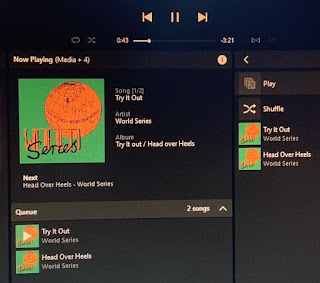World Series were a jazz-funk band in the period 1982-84, when the so-called 'Britfunk' movement was in full swing. You may have seen us if you were going to gigs in London at that time.
We played at various music clubs such as Dingwalls in Camden, the Cricketers at the Oval, the Rock Garden in Covent Garden and the Production Village in Cricklewood. We also had regular weekly gig at the Bull & Gate pub in Kentish Town, where the photo below was taken.
 In 1983, Mike, Keith, Andy and I recorded three tracks at Woodcray Manor, a farmhouse studio in Berkshire. We chose two of the songs from our set, Head Over Heels and Try It Out, for a double A-side single, which was released by a small independent label, Baskerville Records.
In 1983, Mike, Keith, Andy and I recorded three tracks at Woodcray Manor, a farmhouse studio in Berkshire. We chose two of the songs from our set, Head Over Heels and Try It Out, for a double A-side single, which was released by a small independent label, Baskerville Records.Here are the songs:
Head Over Heels by World Series
Back then, the single was played on Robbie Vincent's soul show on Radio London and a few other local radio stations. We did a few promotional appearances with DJs such as Pete Tong. We continued to play live and drew increasing numbers to our gigs, but no major record companies came knocking.
 |
| World Series on stage in 1984 |
Fast forward to 2019 and Mike, now living in Greater Manchester, was contacted by French DJs Clémentine & Saint-James from Parisian label Chuwanaga. They said they had got hold of a copy of Try It Out/Head Over Heels and were interested in re-releasing them both.
At first we were sceptical, but Saint-James assured us he really liked the tracks and was producing a 1980s Britfunk revival festival and accompanying album. He would remaster our songs and release them as a stand-alone single.
Since Mike couldn't immediately lay his hands on the master tape, I sent my test pressing of the original 1983 single to Paris, in the hope that they could use this as the source for the remastering.
 |
| Mike's sleeve notes for the back cover of the re-release |
This was a massive thrill for Mike and I, having never
imagined that our music would be revived in this way. But that was just
the beginning.
Over the early summer months of 2019, Chuwanaga Records rolled out a pre-launch marketing campaign for World Series on social media.
"We're
super excited to finally share with you our next release, an almost
forgotten 7" by Britfunk band World Series, bringing together jazz-funk,
AOR and a really funky vibe.
"Available very soon on July 1st: a perfect fit for summertime
Clémentine and Saint-James went to London in June for the Britfunk revival festival. One Saturday night they appeared on the Gilles Peterson show on BBC Radio 6. Gilles devoted an hour of his show to Chuwanaga's Britfunk revival and during the show, they played Try It Out in full. That was a proud moment, our first play on national radio.
The single was launched in July and became immediately available on Spotify. My daughter works in advertising and one day she sent me a photo showing they were playing World Series over the sound system in her office.
It was just one bizarre thing after another...
Back in the day...
After these recordings in 1983, World Series continued to gig around London and build a strong and loyal following. Like a lot of bands, we were at our best in a live situation and our act was improved further with the addition of Pablo Cook on percussion. Later on that year, Andy left the band and we recruited Mark Ambler, an excellent jazz pianist and synth player, who had a brief time as a pop star with the Tom Robinson Band.
Although we continued to refine our live act, something
of the original chemistry and camaraderie had been lost. World
Series broke up in 1984 just after we recorded our next single. And that was it.
You throw these things away
without proper consideration when you're young, thinking you'll just
move on to something else. But the reality is it's hard to recapture the momentum of a band that has worked at building a sound and an audience.
Of the other band members, I am still in contact with Mike and Pablo. Mike plays live in and around Manchester, working under the stage name Mickey Van Gelder, performing his own compositions, inspired by blues and jazz
standards. He is also a lyricist and occasional singer with the French R&B/jazz group The Swinging Dice.
Pablo Cook went on to great things as a
percussionist with artists such as Moby, Pulp and William Orbit. He was a member of
Joe Strummer & The Mescaleros, worked with Lily Allen on her first recordings and most recently, he played at the farewell concert for Soft Cell at the O2 in London.
Thanks to the folks at Chuwanaga, the music of World Series lives on.
2022 UPDATE: The World Series music continues its surreal afterlife. Here's French disco-funk band 'Echoes Of' rehearsing for a gig in Paris in March 2022 and playing Head Over Heels.
Try It Out / Head Over Heels by World Series are both available on Spotify.
If you'd like to buy the vinyl version, click on the link below. Enjoy!
https://chuwanaga.bandcamp.com/album/try-it-out-head-over-heels?fbclid=IwAR0FH8IF386eFKmUvJqejUMJtRiwysNcrb_OXTJD9JpOzyEv1YrEzx6sChY
IF YOU LIKE MY BLOG, PLEASE HIT THE FOLLOW BUTTON ON THE SIDE PANEL THANKS
Also on this blog:
Music While You Work - A Lockdown Special
A Tribute To Jazz Giant Chick Corea
An Appreciation of Joni Mitchell's classic 'The Hissing of Summer Lawns'
























